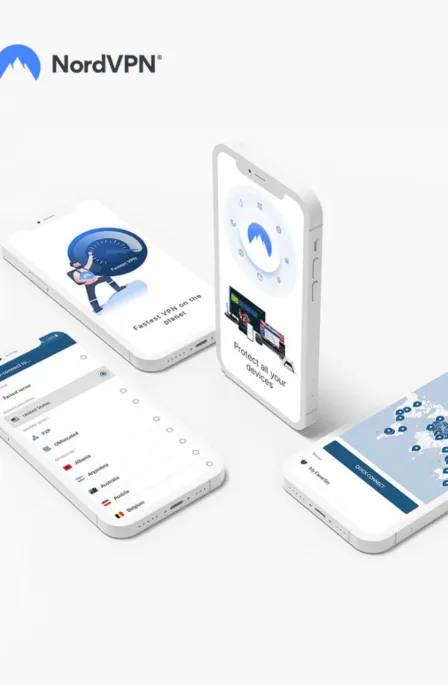NordVPN and ExpressVPN are the two leading VPN providers in 2024. But ExpressVPN has recently been facing much backlash, first after being bought by Kape Technologies in September 2021 and then after thor CIO was fined for his involvement in a hacking program. However, NordVPN’s reputation is not particularly stark, considering the VPN provider faced a hack attack in 2019. Amidst this, the question is bound to arise: which VPN is better to use in 2024?
Since both VPNs still uphold their reputation for providing robust security with super-fast speeds, distinguishing between them is a complex task. To fully determine which VPN is better to use in 2024, there has to be an in-depth comparison regarding privacy, security, various security features, streaming, and torrenting.
A comparison of privacy and security features
NordVPN and ExpressVPN’s popularity is not only because they provide top-notch security and privacy. They also offer a range of security and privacy-boosting features that improve your user experience. These features make both VPN providers a reliable and secure option to consider. The table below gives you a comparison of all the security and privacy features that both VPNs offer. Here is an overview of them:
| Features | NordVPN | ExpressVPN |
| Kill switch | ✓ | ✓ |
| Split Tunneling | ✓ | ✓ |
| Ad/Malware blocker | ✓ | ✕ |
| Obfuscation Technology | ✓ | ✓ |
| Double VPN | ✓ | ✕ |
| Tor Over VPN | ✓ | ✓ |
| IPv6 leak protection | ✓ | ✓ |
| Dedicated VPN | ✓ | ✕ |
| IP and DNS leak protection | ✓ | ✓ |
| Custom DNS option | ✓ | ✓ |
| Public Wi-Fi protection | ✓ | ✓ |
| RAM-only servers | ✓ | ✓ |
| SOCKS5 proxy | ✓ | ✕ |
| Multi-factor authentication | ✓ | ✕ |
Both NordVPN and ExpressVPN have quite a few features in common. The service providers offer basic security to the users by preventing IP leaks via a kill switch. They ensure maximum online security by protecting against various types of VPN leaks. Moreover, you can also use a split tunneling feature to make your torrent downloading process more secure and private. But, NordVPN’s split tunneling feature is only available on Android and Windows platforms.
Both VPNs have obfuscated technology that can help bypass China’s deep packet inspection and browse the web safely. Moreover, both VPNs offer impressive advantages over Tor compatibility, but using NordVPN over ExpressVPN is better. NordVPN has dedicated Tor browser servers that ensure better connection and security.
Besides this, NordVPN has a cybersec feature blocks ads and malware from infecting your device. It even offers a dedicated IP address by which you can maintain more anonymity on the web. In addition, you can even double your security with a double VPN and benefit from NordVPN’s password manager and file encryption software. As ExpressVPN lacks such features, the ultimate winner in this category is NordVPN.
Comparison of privacy Aspects
A VPN’s jurisdiction and logging policy determine how private they are. A private VPN must have a secure jurisdiction away from the 5,9, and 14 eye alliance and be devoid of data retention laws and a strict no-logs policy. A secure jurisdiction and a no-logs policy build users’ trust instilling a sense of reliability that the VPN provider won’t be forced to record and share user information.
Jurisdiction
NordVPN and ExpressVPN belong to a safe jurisdiction that isn’t a part of the five eyes, nine eyes, and 14 Eyes surveillance alliance. NordVPN’s parent company is in Panama, while ExpressVPN’s headquarters is in the British Virgin Islands. The countries don’t follow any mandatory data retention laws or other data privacy laws. Therefore, the companies won’t record and share your data with the ISP, government, or intelligence agencies.
Logging Policy
NordVPN and ExpressVPN are among the best no-log VPN providers. They follow a strict zero-logging policy and refrain from collecting activity or connection logs.
NordVPN’s privacy policy states that:

Similarly, according to ExpressVPN’s privacy policy:

The VPN providers underwent a log audit process to prove their stance on being a no-log VPN. NordVPN has twice audited their log policy by the PwC log audit firm. Also, in 2019, the company hired VerSprite to audit NordVPN’s apps. The reports of the audit process prove that the VPN was free from any vulnerabilities and security flaws. Also, it doesn’t log or share users’ IP addresses and other information that can expose them.
ExpressVPN also underwent a log audit process and proved true with all their claims. But the VPN has only once audited its log policy. It has yet to gain people’s trust again, was somewhat lost after Kape Technologies bought it, and due to their CIO’s involvement with a hacking program.
Privacy verdict
NordVPN and ExpressVPN belong to a privacy-friendly jurisdiction that isn’t a part of the global surveillance alliance. Moreover, they follow a verified no-log policy, but NordVPN surpasses ExpressVPN in this category. NordVPN has several times audited its log policy and has undergone other tests to prove its credibility after its servers were hacked in 2019.
Meanwhile, ExpressVPN has only once audited its log policy. Also, they’re now acquired by a company with a shady track record and can put users’ privacy at risk. Thus, NordVPN outshines ExpressVPN in this category.
Security comparison
Security is one of the most crucial elements of a VPN, which can be determined by thoroughly inspecting the encryption algorithms and tunneling protocols it uses. Only a VPN deploying robust encryption algorithms and tunneling protocols can ensure that the user information and identity remain safe from snooping eyes.
Encryption
NordVPN and ExpressVPN use military-grade encryption to safeguard user data from prying eyes. There can’t be any comparisons since both the VPN providers use strong AES-256-bit encryption, 4096-bit RSA key, and SHA512 hash key. Hence, both VPN providers seem reliable when encrypting user information.
Protocols
NordVPN and ExpressVPN support a range of all popular tunneling protocols. They both widely use OpenVPN and IKEv2 protocols. You can use Android, iOS, macOS, and Windows protocols and enjoy maximum security. The OpenVPN protocol supports the UDP and TCP ports and allows users to configure them per their needs. But if you’re using an Android or iOS device, it’s better to use the IKEv2 protocol. It’s because it offers a speedy connection without compromising security.
Along with these generic protocols, these two VPN providers’ respective proprietary protocols stand out. NordVPN uses the NordLynx protocol built around the WireGuard technology. The WireGuard protocol, which serves as its base, is the latest open-source and widely accepted protocol that maintains speed and security. The protocol helps connect to NordVPN servers faster and significantly improves connection speeds without compromising security or privacy.
ExpressVPN also has its proprietary Lightway Protocol. It is a lightweight and secure VPN protocol that offers super-fast speeds, a stable connection, and robust online security. The Lightway protocol uses wolfSSL, a well-established cryptography library thoroughly examined by third parties, specifically against the FIPS 140-2 standard.
ExpressVPN has the protocol open-sourced, with its core code published on GitHub to further vouch for its security and enable user traits. Moreover, it has also undergone an independent security audit by the renowned cybersecurity firm Cure53.
Security verdict
Both NordVPN and ExpressVPN provide robust security and protection to users. They use the industry’s highest AES-256-bit encryption and secure OpenVPN and IKEv2 protocols. What differs between the two VPN providers is their proprietary protocols. The NordLynx protocol and Lightway are both secure protocols enabling super-fast speeds and robust security.
Moreover, these protocols are also reliable since they are both open-source codes. However, it seems that the Lightway protocol by ExpressVPN might be a bit more reliable since the VPN provider has the code independently audited through Cure53. Therefore, this slight difference gives ExpressVPN somewhat of an upper hand when providing user security.
Streaming and Torrenting
Streaming and Torrenting come with a hoard of online privacy and security issues. There are annoying geographical restrictions, for starters, and along with that comes the ISP throttling issues. While these two might be your only concern when streaming if you decide to torrent, another problem that adds to the list is “maintaining online anonymity.”
In short, streaming and torrenting might be fun, but data snoopers and various restrictions take all the fun out of it, which is why you need a reliable VPN with them. Since not all VPNs might help, it is crucial to look for specific features to determine if the VPN allows streaming and torrenting.
Streaming
Bypassing geo-restrictions on streaming platforms has slowly become arduous, especially since Netflix’s VPN bans. As the online restrictions grow, it is hard to find reliable VPNs managing to bypass them easily. However, ExpressVPN and NordVPN are the few VPNs that work perfectly with Netflix. Both VPNs allow access to restricted content from several regions, including the UK, the US, Canada, and Germany.
It is not only Netflix that these VPNs are compatible with; instead, they allow users to stream content on every available streaming platform, including Amazon Prime, BBCiPlayer, Hulu, HBO, and Disney Plus. Both VPN providers are also compatible with various streaming devices, including SmartTVs, FireStick, or even Chromecast.
While allowing streaming, ExpressVPN and NordVPN help bypass geo-restrictions and provide super-fast speeds. There are no buffering issues while streaming with NordVPN or ExpressVPN, and both VPNs allow streaming in HD Quality. To further facilitate their users in streaming, both VPNs offer a SmartPlay feature that allows casting or mirroring. Therefore, this feature allows users to stream content on any platform that does not even support a VPN.
Both NordVPN and ExpressVPN seem dedicated to enabling their users a secure, fast, and stable streaming experience. Where NordVPN continuously evades geo-restrictions by regularly updating its server list, ExpressVPN has the SmartDNS known as MediaStreamer that helps bypass online restrictions by spoofing IP addresses.
Torrenting
A stable torrenting experience demands bypassing geo-restrictions, maintaining user anonymity, and ensuring super-fast speeds. While few VPNs support torrenting, NordVPN and ExpressVPN support torrenting through dedicated P2P servers and various P2P-friendly features.
Both NordVPN and ExpressVPN enable secure and reliable P2P file sharing and transfer through multiple features like network kill switch protection, split tunneling, and torrent IP leak protection; however, there are a few key differences.
For starters, there is a difference in the number of server networks, which somewhat ultimately impacts users’ downloading speeds. NordVPN offers a vast P2P server consisting of more than 2000 servers. These servers are spread across the globe, including the UK, US, and France.
Thus, the downloading speed NordVPN offers is blazing-fast and without significant buffering and connection lags. In contrast, ExpressVPN has 180 P2P servers. Though it ensures fast speed and even allows you to test the server speed before establishing a connection, the server network is not as vast as NordVPN; hence it can impact the speeds.
Another significant difference between the two VPNs is that NordVPN helps enable a much more secure, stable, and reliable downloading experience due to its SOCKS5 Proxy. The proxy helps provide a better user experience through a much more stable P2P connection.
Moreover, in most countries, torrenting is a somewhat risky business, even for legitimate downloading, that can result in fines, DMC notices, and often even jail time. Since the privacy provided by ExpressVPN does seem somewhat hazy, precisely due to the involvement of their CIO in a hacking program, using it for torrenting might be somewhat risky.
Streaming and Torrenting Verdict
NordVPN and ExpressVPN are good options when streaming blocked content or downloading torrents. They offer the essential features that ensure the best experience. But as NordVPN has more global and P2P servers than ExpressVPN, which is much more reliable in privacy, NordVPN ultimately seems like a better option than ExpressVPN.
Conclusion
ExpressVPN and NordVPN provide top-quality performance. Both offer fast speed, an extensive server network, and excellent streaming and torrenting abilities. But based on the above ExpressVPN vs. NordVPN comparison, NordVPN seems to be a better option.
Overall, NordVPN is the best VPN service in 2024, which uses advanced features and has undergone an in-depth audit process. ExpressVPN comes second because of privacy scandals, Kape Technologies’ acquisition, and lack of features.
Share this article
About the Author
Rebecca James is an IT consultant with forward thinking approach toward developing IT infrastructures of SMEs. She writes to engage with individuals and raise awareness of digital security, privacy, and better IT infrastructure.
More from Rebecca JamesRelated Posts

NordVPN vs Surfshark: See Which Provider Stands Out? (Updated)
NordVPN and Surfshark VPN are popular and the best top-rated VPN providers. NordVPN has provided exc...

ExpressVPN vs Surfshark VPN: The Ultimate Side-By-Side Comparison. Which One Wins?
ExpressVPN and Surfshark VPN are among the most trusted VPN providers out there. Both VPN providers ...

Avast VPN vs. NordVPN: Which is the Better VPN Service in 2024?
NordVPN and Avast VPN are pretty known names in the VPN industry. Avast VPN is a product of Avast An...





